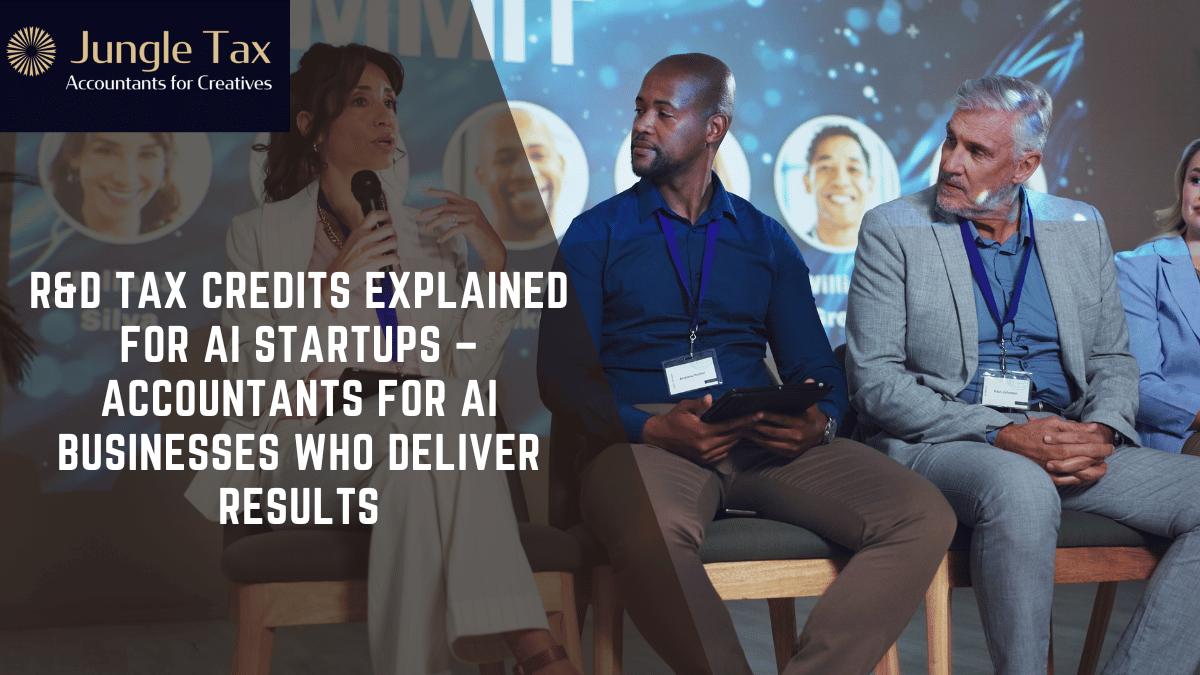
Innovating in artificial intelligence is both thrilling and expensive. With every new algorithm, dataset, or neural network, startups invest heavily in development and experimentation. Fortunately, the UK government recognises this effort through R&D tax credits—a powerful incentive designed to reward innovation. But here’s the catch: most AI founders don’t realise just how much they could be claiming, or worse, they miss out entirely due to poor accounting. That’s where accountants for AI businesses become essential, especially those who understand the complexity of tech-driven research.
What Are R&D Tax Credits and Why Do They Matter?
R&D (Research and Development) tax credits are a government-backed initiative that allows innovative companies to reclaim a percentage of their qualifying research expenditure. If you’re building unique models, experimenting with machine learning techniques, or tackling technical uncertainty, your AI startup could be eligible. And we’re not just talking about pocket change—startups can recover up to 33% of their R&D costs.
That could translate to tens or even hundreds of thousands of pounds back into your cash flow, giving your business room to hire, scale, and continue iterating. But without proper financial guidance, these claims can be rejected, underclaimed, or delayed.
Why AI Startups Need Specialist Accountants
AI startups face a unique set of challenges when it comes to accounting. Traditional firms often struggle to understand what qualifies as R&D within deep tech environments. That’s why working with accountants for AI businesses is not just helpful—it’s critical.
Specialist accountants will identify all qualifying activities, from developing natural language processing algorithms to optimising training frameworks. They help you distinguish between capitalised costs and eligible expenses, structure your payroll to qualify for maximum relief, and ensure you’re categorising cloud computing and software costs correctly.
At JungleTax, our team understands the intersection of artificial intelligence, innovation, and tax. We’ve helped multiple AI founders like you file precise, compliant, and maximised R&D claims.
Common Mistakes AI Startups Make with R&D Tax Credits
One of the biggest traps AI startups fall into is assuming that only lab coat-style research qualifies. In reality, many AI projects qualify under HMRC’s definition of “scientific or technological uncertainty.” Building and training proprietary models, improving AI architecture, or integrating automation with unpredictable environments all count.
Another mistake is poor documentation. HMRC demands evidence of qualifying work—if your project logs, experiments, or technical notes aren’t organised, it could delay your claim or result in rejection. That’s why specialist accountants for AI businesses will work with your developers, not just your finance team, to ensure your submission is rock solid.
Finally, startups often file too late or miss the two-year deadline. In some cases, they only discover R&D reliefs after they’ve already lost the chance to claim. Having a proactive accountant ensures you stay ahead and never leave money on the table.
How JungleTax Makes R&D Simple for AI Innovators
Our job isn’t just to help you save money—it’s to make the process seamless and stress-free. JungleTax specialises in working with AI and tech founders, offering smart, scalable tax support that fits the way startups operate.
We start by assessing your product and projects in a way that aligns with both HMRC standards and your business goals. We then build a detailed claim with clear technical justifications and precise cost breakdowns. Because we’re deeply familiar with AI workflows, we can speak the language your engineers use—and that HMRC needs to hear.
Whether you’re a team of five working on predictive modelling or a scaling SaaS AI platform, our accountants for AI businesses are ready to guide you from prototype to profit.
You can explore more about our AI-specialist services through our [AI accounting support page] or connect directly via our [accountants for content creators section], where we also support hybrid tech-creators crossing the AI and content industries.
Preparing for Future R&D Claims
As the landscape for AI startups evolves, so too does the scrutiny around R&D claims. HMRC has introduced new rules around digital submission formats and is tightening eligibility reviews. This makes expert support non-negotiable for future-facing startups.
Start preparing now by integrating R&D tracking into your project management, time logging, and cost allocation systems. Even if your startup is pre-revenue, early tracking can lead to stronger claims down the line. At JungleTax, we also offer workshops and consultations tailored to first-time founders needing help navigating this space.
And remember, R&D claims can often be used to reduce your Corporation Tax liability or even result in a cash credit from HMRC—both of which are vital for AI companies burning through runway.
Are You Leaving Money on the Table?
If you’re building AI, you’re likely doing R&D. But unless your accountant understands the fine print, you’re at risk of underclaiming—or worse, facing a compliance headache. Choosing an expert team like JungleTax means choosing confidence, clarity, and capital.
Get in touch with us today. Whether you’re pre-seed, scaling, or somewhere in between, we’ll help your AI business grow smarter—with the numbers to prove it.
Just a call or click away – Let’s Connect
Email: hello@jungletax.co.uk
Phone: 0333 880 7974
Frequently Asked Questions
Q1: How do I know if my AI project qualifies for R&D tax credits?
If your team is working on solving technical challenges where the outcome wasn’t certain, you likely qualify. Speak to a specialist accountant to assess your eligibility.
Q2: How much can I claim through R&D tax credits?
Startups can reclaim up to 33% of qualifying R&D expenses. The exact amount depends on your structure and costs.
Q3: What expenses count toward an R&D claim?
Staff wages, contractor costs, software, cloud computing, and even some utilities may qualify, depending on the project.
Q4: Can I claim R&D tax credits if I’m not making a profit?
Yes. Loss-making companies can still receive a cash credit, which can be crucial for early-stage growth.
Q5: What makes JungleTax different from other accounting firms?
We specialise in AI, tech, and creator-driven startups. Our deep understanding of innovation and tax ensures claims are accurate, maximised, and stress-free.
